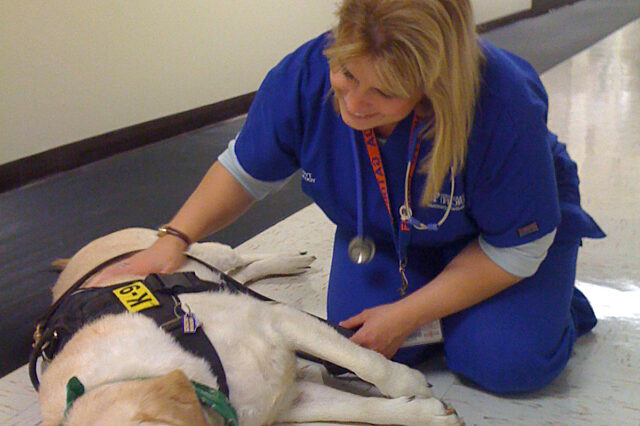UF veterinary oncologists break new ground with urethral cancer treatment

UF veterinary oncologist Amy Beaver is shown with Sophie during one of her visits to UF. (Photo courtesy of Amy Beaver)
When Sgt. Troy Fergueson of the Pasco County Sheriff's Office and his wife, Laura, held a memorial service in Hudson, Fla., for their beloved dog, a yellow Labrador named Sophie, more than 100 people paid their respects. Among them were law enforcement officers, friends, and University of Florida veterinary surgical oncologist Nick Bacon and veterinary technician Amy Beaver.
The Ferguesons believe UF veterinarians gave them two-and-a-half more years with Sophie, who was diagnosed in May 2008 with urethral cancer. Sophie became something of a media celebrity after her illness because of several community fundraising campaigns to raise the money needed to save her life. The dog was celebrated at the service for her contributions to law enforcement and to the people she touched as part of her search and rescue work.
“Sophie’s life was extended as a direct result of the care she received at UF,” Laura Fergueson said. “Without treatment, she would have lived maybe a month or two. Sophie was even able to continue her search work, until four months ago.”
Bacon said Sophie ultimately died of kidney failure, not cancer.
“Sadly all animals ultimately die, but it’s unheard of to have that length of survival in a urethral cancer patient,” he said.
In conjunction with Frank Bova, Ph.D., a professor of neurosurgery associated with UF’s McKnight Brain Institute, UF veterinary oncologists treated Sophie with stereotactic radiosurgery, a new procedure for veterinary medicine that involves sophisticated image guidance and targeted, high-dose radiation, administered through the use of a LINAC Scalpel, a stereotactic linear accelerator invented at UF that has long been used to treat human cancer patients. At the time Sophie was treated, the oncology team was only beginning to use the procedure to treat urethral cancer in dogs. UF became only the second veterinary hospital in the country to use the technique.
Since then, UF veterinarians have performed nine urethral and three prostate cancer procedures in dogs. Bacon presented the team’s findings to the Veterinary Cancer Society in Las Vegas in March, and at the American College of Veterinary Surgeons meeting in Seattle in October.
Bacon said the addition of a linear accelerator to UF’s Small Animal Hospital, which opened in November, means that stereotactic radiosurgery can now be performed in a veterinary setting instead of the McKnight Brain Institute, although collaborations with faculty and staff there will continue.
“Having the linear accelerator located on-site in our hospital makes everything quicker and simpler,” Bacon said. “There will be no restrictions on when we can do these procedures, so we can treat our patients even more expeditiously and also take advantage of other UF veterinary faculty expertise more easily when we need to.”
The urethra is found in people and animals and is essentially a tube exiting the bladder through which urine can leave the body.
“Any tumor, even an early one, can cause complete obstruction,” Bacon said. “Once there is an obstruction, most animals are put down within days. Even with other types of therapies, most are put down within weeks. Chemotherapy has some effect, but it seems high-dose radiation can also help. Sophie received a combination of radiation and chemotherapy.”
In some cases, using another technologically advanced method known as interventional imaging, UF veterinarians are able to temporarily alleviate the obstruction with a urethral stent.
“Now we can see a dog with urinary obstruction on day one, diagnose the problem and stent the urethra under one procedure,” he said. “Without our interventional program, you might not be able to go in and irradiate the tumor afterward, so it’s very important to have all of these capabilities on-site.”
In cases of urethral cancer, dogs can be acting entirely normally — playing, eating, running, barking — but they are unable to urinate, Bacon said.
“So owners have a dog that one day looks normal, then the next day they are being told they have to put the dog down,” he said.
“It affects dogs with almost no warning, and any dog can be affected. These dogs are typically euthanized after days to weeks. Four of the nine urethral cancer dogs we treated lived longer than six months, and two lived longer than one year. With the advanced imaging, advanced radiation and advanced surgery we offer, we are really furthering the boundaries of what is treatable in canine cancer.”
Beaver, who works with the oncology group at the UF Small Animal Hospital, said the memorial held for Sophie was a reminder of why she loves her job. A poster she had given the Ferguesons two years ago, which documented Sophie’s care and treatment at UF in scrapbook form, was on display at the event.
“It was an affirmation that I’m in the right profession,” Beaver said.
For more information about the UF Small Animal Hospital, see www.vethospitals.ufl.edu or call 352-392-2235.
About the author
